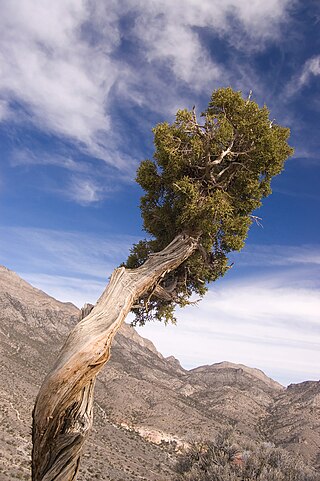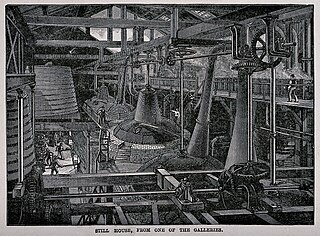
Gin is a distilled alcoholic drink flavoured with juniper berries and other botanical ingredients.

Scotch whisky, often simply called whisky or Scotch, is malt whisky or grain whisky made in Scotland.

Junipers are coniferous trees and shrubs in the genus Juniperus of the cypress family Cupressaceae. Depending on the taxonomy, between 50 and 67 species of junipers are widely distributed throughout the Northern Hemisphere as far south as tropical Africa, including the Arctic, parts of Asia, and Central America. The highest-known juniper forest occurs at an altitude of 4,900 metres (16,100 ft) in southeastern Tibet and the northern Himalayas, creating one of the highest tree lines on earth.

Juniperus communis, the common juniper, is a species of small tree or shrub in the cypress family Cupressaceae. An evergreen conifer, it has the largest geographical range of any woody plant, with a circumpolar distribution throughout the cool temperate Northern Hemisphere.

Jenever, also known as Hollands, genever, genièvre, peket, or sometimes as Dutch gin, is the juniper-flavoured traditional liquor in the Netherlands, Belgium, and adjoining areas in northern France and northwestern Germany. As an EU and UK Protected Designation of Origin, the term jenever and its soundalikes can only be used if the product is made according to the specifications in Belgium, the Netherlands, two northern French departments, and two German federal states. Gin was developed in Britain after the introduction of jenever to the island.

Glengoyne distillery is a whisky distillery continuously in operation since its founding in 1833 at Dumgoyne, north of Glasgow, Scotland. Glengoyne is unique in producing Highland single malt whisky matured in the Lowlands. Located upon the Highland Line, the division between the Highlands and Lowlands of Scotland, Glengoyne’s stills are in the Highlands while maturing casks of whisky rest across the road in the Lowlands.

Bruichladdich Distillery is a distillery on the Rhinns of the isle of Islay in Scotland. The distillery produces mainly single malt Scotch whisky and The Botanist gin. Originally established in 1881 but closed many times throughout its history, its current form was opened in 2001. It has been owned by Rémy Cointreau since 2012.
Tanqueray is a brand of gin produced by Diageo plc. It originated in London. While it does not command a sizable market share in its native market, its largest market is the US.

Hendrick's Gin is a brand of gin produced by William Grant & Sons at the Girvan distillery, Scotland, and launched in 1999. The brand was created by spirits marketer Steven Grasse, while the gin itself was conceived by Lesley Gracie, a Yorkshire native, who was hired by William Grant & Sons to work in new liquid development for some of their products. A decade later she was tasked with creating a new super-premium gin. In addition to the traditional juniper infusion, Hendrick's uses Bulgarian rose and cucumber to add flavour. Hendrick's gin is bottled in a dark brown, apothecary-style bottle.

Juniperus phoenicea, the Phoenicean juniper or Arâr, is a juniper found throughout the Mediterranean region.

Sipsmith is a microdistillery located in London. It is the first copper-pot distillery to open within Greater London' in nearly two centuries. It has been owned by Suntory Global Spirits, a subsidiary of Suntory Holdings of Osaka, Japan, since December 2016.
Brinjevec is a strong alcoholic drink, produced in the Karst and Brkini regions in Slovenia. It is re-distilled from ground and fermented juniper berries only and it differs from similar drinks that have different alcohol bases with added juniper flavor. It has a clear transparent color and it is meant for folk medicinal use and not for regular drinking. It contains between 40% and 50% alcohol and has a very distinctive tart taste
Sacred Spirits is a microdistillery in Highgate, London. It distills its spirits under a vacuum in glassware, and thus at a lower temperature than traditional pot stills, which operate at atmospheric pressure. The microdistillery operates out of the back room of a residential house, with a vacuum plant in a wendy house in the distiller's back garden. It is an authorised Customs and Excise distillery.
A Lomond still is a type of still that was sometimes used for whisky distillation, invented in 1955 by Alistair Cunningham of Hiram Walker. It is used for batch distillation like a pot still, but has three perforated plates which can be cooled independently, controlling the reflux through the apparatus in a manner similar to coffey stills. This allows the distiller to produce different kinds of whisky in the same still. Lomond stills, despite their name, have never been used at the Loch Lomond distillery only at the Hiram Walker Glenburgie, Miltonduff, Inverleven and Scapa distilleries.. For a time, the only remaining Lomond still was in the Scapa distillery, where it is used as a wash still, in combination with a traditional pot still. In 2010, Bruichladdich distillery installed the original still salvaged from the demolished Inverleven distillery as a gin still. In 2015 new Lomond stills were installed at InchDairnie distillery. Loch Lomond Distillery has Lomond Stills installed, though it is unknown how long they have been there.
Broker’s London Dry Gin is a brand of gin micro-distilled at a 200-year-old distillery located near Birmingham, England, using a traditional copper pot still.

The London Distillery Company, also known as TLDC, was a distillery based in Bermondsey, London. Originally located in Battersea TLDC produced English whisky, Rye whisky, London gin and British spirits, compounds and cordials. TLDC also created experimental spirits under the TESTBED brand; named after the art space of similar ethos by architect Will Alsop.
Malfy Gin is a brand of gin bottled in Italy, distilled by Torino Distillati, and distributed by Pernod Ricard.

The following outline is provided as an overview of and topical guide to whisky:

Crafter's is a Nordic gin brand that includes classic London Dry Gin and Aromatic Flower Gin produced by Estonian distillery Liviko. Both gins are handcrafted in Estonia, copper-pot distilled and made in small batches. In 2018 Liviko exported Crafter's gin to 25 countries. The juniper berries used in the making of Crafter's gin are reused in the Re-crafted Crafter's handcrafted beverages, as the berries retain a valuable part of their flavour even after distillation. Liviko was nominated to World Beverage Innovation Award in 2019 for its zero-waste product innovation that lead to a new category of drinks.













